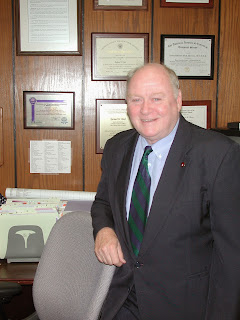Clik here to view.

Dr. Richard H. Ward, 1999,2006
As a former New York City police detective, Dr. Richard H. Ward helped strengthen the ties between academics and practitioners during his tenure as Dean of the College of Criminal Justice from 1999 to 2006.
“It is a great place, and our alumni are going places,” said Dr. Richard H. Ward, now the Doctoral Program Director and Vice President for Special Programs Sponsored Research at the University of New Haven in Connecticut. “The program has grown. I run into alumni as I travel all over the world; there are lots of Sam Houston State University graduates.”
Image may be NSFW.
Clik here to view.
Dean Ward supported the LEMIT and CMIT programs.During his term as head of the College of Criminal Justice and the Criminal Justice Center, the Bill Blackwood Law Enforcement Management Institute of Texas (LEMIT) and the Correctional Management Institute of Texas (CMIT), with missions to train professionals in leadership and management in the field, flourished. Research partnerships were established with the Houston Police Department and international exchange programs enabled the College to train foreign police and SHSU students to visit police agencies abroad.
“The faculty became more diverse and the international faculty changed our perspectives,” said Dr. Ward. “We generated more publications and sent more people abroad.”
Image may be NSFW.
Clik here to view.
Dr. Ward with the College's faculty.He also ushered in the criminal justice program at the University Center at the Lone Star College System, a conglomeration of six state universities located in The Woodlands.
Dr. Ward came to SHSU from the University of Illinois at Chicago, where he served as Vice Chancellor for Administration and Associate Chancellor. He is the author of books and articles on international crime, terrorism, criminal investigations and other topics. He had worked as a consultant and trainer in more than 40 countries. He also had been the Dean of Students, Dean of Graduate Studies and Vice President of John Jay College of Criminal Justice in New York.
“It was a big change coming from Chicago to Huntsville,” said Dr. Ward. “I had to learn how to drawl…I was sad to leave Texas. I loved Texas. It had a different kind of spirit than anywhere else in the world.”
Image may be NSFW.
Clik here to view.
Dr. Ward enjoyed the Texas lifestyle. In 2000, the LEMIT building opened, continuing to offer premiere professional development opportunities in policing. It serves diverse law enforcement agencies in the state, including police, sheriffs, constables, school and campus police, Alcohol and Beverage Control agents, district attorney and attorney general officers and emergency management coordinator. In 2001, the Texas Legislature created a permanent funding source for CMIT to provide executive development and leadership in adult and juvenile corrections and technical assistance.
Other programs that took off at this time were the Master of Science in Forensic Science and the Crime Victims Institute, which provides research on victim issues in the state. Grants were also received for Project Safe Neighborhood, an initiative aimed at curbing firearms-related crime.
Image may be NSFW.
Clik here to view.
Dr. Ward built international partnerships.Dr. Ward also built relationships with law enforcement agencies in other countries, including China, Korea, Poland, Turkey, Pakistan, and Taiwan, many of which sent delegations of students to enroll in the criminal justice program. The College also provided Study Abroad opportunities to allow criminal justice student to experience systems in other countries.
“Most programs did not have those kinds of contacts,” said Dr. Ward. “It was giving our student an international focus, which is a blessing today because of globalization.”
Image may be NSFW.
Clik here to view.
Dr. Ward trained security specialists.As co-author of Extremist Groups, a public information source used by government and security specialists, the College also was involved in fighting terrorism through the Institute for the Study of Violent Groups. He also helped launch the Incident Command Simulation Training Program that train crisis management teams in the event of natural or manmade disaster.
“This was a long way from where I came from in 1962 when I joined the police department in New York,” said Dr. Ward. “There have been a lot of great changes…. It shows the contributions the University makes – the alumni get out and make the world a better place.”